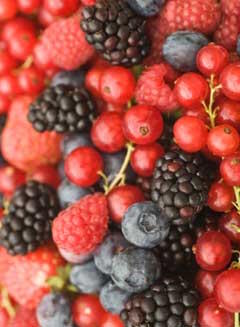22-05-2012
Slow down the ageing process with red berries
 The extraordinary nutritional content and high antioxidant ranking of berries are now well-recognised by the scientific community. These ‘superfruits’ have considerable antioxidant potency and their ORAC indexes are among the highest in the plant kingdom.
The extraordinary nutritional content and high antioxidant ranking of berries are now well-recognised by the scientific community. These ‘superfruits’ have considerable antioxidant potency and their ORAC indexes are among the highest in the plant kingdom.
These ‘berry treasures’ are found pretty much all over the globe: Acai in Brazil, Goji in China, Cranberries and Aronia in North America, Maqui in Chilean Patagonia, Camu camu in Peru, Mangosteen in tropical Asia, and more commonly in our part of the world, we have blueberries, raspberries, strawberries, blackcurrants, cherries, pomegranates and grapes. And yet it is sometimes difficult to incorporate a serving of these berries into our daily diets … even though their health benefits continue to be demonstrated. According to a recent study published in the Annals of Neurology, a high consumption of red berries, particularly blueberries and strawberries, helps slow down cognitive decline in elderly people.
Dr Elizabeth Devore and colleagues at Brigham and Women’s Hospital closely examined data from the Nurses’ Health Study which monitored women aged between 30 and 55 at the start of the study in 1976.
The women filled out diet questionnaires every four years from 1980 onwards and the mental function of over 16,000 participants aged over 70 was tested every two years between 1995 and 2001.
Dr Devore and her team analysed the frequency of consumption of berries as well as around thirty flavonoids commonly found in the diet.
At the end of the follow-up period, it was found that women who ate relatively high amounts of blueberries or strawberries scored higher in the cognitive tests than women with a lower intake. Higher berry consumption appeared to delay cognitive decline by up to 2.5 years. Intake of total flavonoids, and anthocyanidins – a type of flavonoid – was also associated with a slower rate of decline. Flavonoids, particularly anthocyanidins, are able to cross the blood-brain barrier and travel to areas of the brain responsible for learning and memory such as the hippocampus. They therefore reduce the effect of inflammation and oxidative stress on cognitive function. This research provides “the first epidemiological evidence that berry consumption may slow progression of cognitive decline in elderly women”. The findings “have important public health implications as increasing berry intake is a fairly simple dietary modification to test cognition protection in older people”.
Other scientific studies have also highlighted how phytonutrients such as chlorophyll, carotenoids and other antioxidants help protect the body from free radical damage. Therefore, to complement the beneficial effects of red berries, it is always a good idea to either alternate – or add alongside - fruits and vegetables of a different colour, in order to ingest protective substances such as lutein and lycopene, or sulforaphane from green vegetables (spinach and broccoli), algae (spirulina) or barley grass or wheatgrass juice.
Further reading
28-08-2019
Though many people are not aware of choline, it is actually recognised as an essential nutrient by the prestigious US National Academy of Medicine 1...
Read more10-10-2016
In India, turmeric is used to treat a wide variety of ailments including gastrointestinal problems, inflammation, headaches, infections and colds. It is turmeric’s curcuminoid content,...
Read more21-08-2019
The fight against ageing continues. Researchers working for a start-up biotech company have discovered the beneficial effects of urolithin A 1 , a substance produced...
Read more© 1997-2025 Fondation pour le Libre Choix
All rights reserved
All rights reserved
Free
Thank you for visiting our site. Before you go
REGISTER WITHClub SuperSmart
And take advantage
of exclusive benefits:
of exclusive benefits:
- Free: our weekly science-based newsletter "Nutranews"
- Special offers for club members only

















